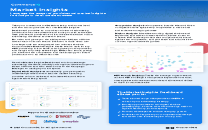
CommerceIQ
Founded Year
2012Stage
Series D | AliveTotal Raised
$195.5MValuation
$0000Last Raised
$115M | 4 yrs agoAbout CommerceIQ
CommerceIQ operates within the ecommerce technology sector, focusing on retail ecommerce channels for brands. The company's platform utilizes machine learning and automation to support marketing, supply chain, and sales operations. CommerceIQ was formerly known as Boomerang Commerce. It was founded in 2012 and is based in Mountain View, California. CommerceIQ operates as a subsidiary of Lowe's.
Loading...
CommerceIQ's Product Videos


ESPs containing CommerceIQ
The ESP matrix leverages data and analyst insight to identify and rank leading companies in a given technology landscape.
The e-commerce advertising platforms market provides software solutions for managing and optimizing advertising campaigns on e-commerce marketplaces like Amazon, Walmart, and other retail sites. These platforms offer tools for campaign creation, bid management, keyword optimization, and performance analytics specifically tailored for marketplace advertising. Companies in this market serve brands, …
CommerceIQ named as Leader among 8 other companies, including Skai, Salsify, and Profitero.
CommerceIQ's Products & Differentiators
Digital Shelf Automation & Analytics
Allows brands to optimize day-to-day operations by using digital shelf insights to clarify your most strategic e-commerce decisions. Includes unified reporting to help diagnose and resolve issues, automation to keep the digital shelf optimized, supply chain alerts to maintain in-stocks, and category/brand insights.
Loading...
Expert Collections containing CommerceIQ
Expert Collections are analyst-curated lists that highlight the companies you need to know in the most important technology spaces.
CommerceIQ is included in 6 Expert Collections, including E-Commerce.
E-Commerce
11,424 items
Companies that sell goods online (B2C), or enable the selling of goods online via tech solutions (B2B).
Unicorns- Billion Dollar Startups
1,309 items
Grocery Retail Tech
648 items
Startups providing B2B solutions to grocery businesses to improve their store and omni-channel performance. Includes customer analytics platforms, in-store robots, predictive inventory management systems, online enablement for grocers and consumables retailers, and more.
Conference Exhibitors
5,302 items
Retail Media Networks
467 items
Tech companies helping retailers build and operate retail media networks. Includes solutions like demand-side platforms, AI-generated content, digital shelf displays, and more.
Artificial Intelligence (AI)
20,894 items
Latest CommerceIQ News
Sep 11, 2025
How Brands are Rethinking Pricing Strategy Amid Tariff Uncertainty September 11, 2025 at 7:47 AM EDT By Sai Koppala, CommerceIQ WrightStudio-stock.Adobe.com Brands are being squeezed like never before. On one hand, federal trade policy is causing the price of just about everything to go up, thanks to tariffs and the resulting second-order effects. On the other hand, brands are under pressure to maintain steady prices on platforms like Amazon and Walmart. Then there are the consumers who are feeling spooked from all the uncertainty this creates. All told, it’s safe to say most retail brands are feeling the effects of this whiplash. But not everyone is suffering equally. Some brands are finding ways to protect profits while maintaining consumer trust, all without angering major platforms and retailers. While there is no single, simple trick, there are some strategic takeaways that can help brands make better decisions in a volatile market. Prioritize Predictability over Promo Codes One of the simplest and most impactful things retail brands should immediately do to protect their bottom lines is slow down on discounting and promotions. In fact, our data shows that best-in-class brands have already been doing this since late Q1, when talk of tariffs first arose. Intuitively, deprioritizing promotions and discounts while prices are rising doesn’t make sense. When prices go up, the natural instinct is to immediately reach into the promotions budget to avoid scaring away customers. However, aggressive discounting can squeeze margins, and because brands have a limited promotional budget available, they often exhaust this budget too quickly. It’s a short-term bandage that doesn’t stop the bleeding; it just hides it for a bit. Advertisement The reality is that costs are likely to continue to rise, and retail platforms will continue to put pressure on sellers to keep price increases to a minimum. Stopping discounting now, or at least significantly reducing the size and number of discounts available, allows brands to preserve their margins and maintain a healthy P&L now — so if things get worse later, they’ll be in a better position to absorb the shock. Alternatively, some brands are using the savings from pausing discounts to offset some portion of their cost increases, creating more stability in consumer pricing and building trust with shoppers. From a consumer perspective, getting a discount might be an immediate win, but it’s even better to know that a roll of paper towels will cost the same a week from now as it does today. Reallocating the discount/promo budget toward price stability makes brands stand out when everyone else is increasing prices and leveraging more discounts. Optimize Operations to Offset Rising Costs Every business wants to operate as close to full efficiency as possible at all times. The reality typically falls far short of that goal: during good times, efficiency gets deprioritized for growth, and during bad times, it tends to look more like panic than a methodical, point-by-point practice. For example, it might be easier to arbitrarily lay off 10% of a workforce than to find 10% in savings across every operational motion, but there are only so many employees a company can cut before the entire team is three people trying to do the jobs of 100. The traditional move during uncertain times was to parking-lot every other initiative and lock senior management in a room with the books until they found every fraction of a percent of efficiency they could. Are there software or services that can be replaced for less or cut entirely? Can packing or shipping lines save a few seconds per parcel by changing the layout or adding a new piece of equipment that has a relatively short ROI? Now, with agentic AI technologies , brands can move faster and with greater precision rather than relying on leadership to perform manual audits and make gut decisions. AI agents can monitor operations, identify inefficiencies and even act autonomously to make improvements. Doubling down on operations pays off twice: first by offsetting price hikes with new savings now, but also later by positioning the business for greater profitability once the economy settles. Lead with Transparency, Keep Customer Loyalty Traditionally, many of the brands we’ve worked with and observed have been hesitant to discuss pricing or share their strategies with customers, at least outside of the context of discounts and sales. Those days are over, and oversharing is the new best practice for successful sellers. Consumers know that big things are happening in global trade — they see news reports, get social media updates and hear about every tariff and retaliation in conversations. So when a seller doesn’t address how tariffs are affecting pricing head-on, it becomes a source of potential anxiety, just like any “elephant in the room” situation. Anxiety reduces shopping, breaks consumer trust and erodes brand equity. The answer, as smart brands have figured out, is to become part therapist, part analyst, part consultant and part oversharer. Here’s what that means: Reassure consumers that things will be OK while acknowledging that their feelings and worries are real and valid. Contextualize what’s happening in a way that makes complicated policy simple and easy to relate to. Provide insight and forecasting as an expert to help them plan their purchasing decisions. Give more information rather than less, and be honest and transparent to a fault. In practice, this looks like providing early warnings about price changes as soon as possible, and being detailed and thorough in explaining what’s changing and why. If a new policy is going to increase raw materials cost by 10%, but the company can absorb the cost, communicate that with a short update: “We’re expecting the cost of our raw materials to go up by 10%, but we’re going to try to avoid increasing prices as long as possible.” If prices have to go up, then that’s even more important to share, with as much detail as possible to explain why. Open, transparent, and timely communication will gain customers’ trust, and that will make them less likely to flee if costs go up and more likely to become loyal, long-term customers. Navigating the Unknown The thing about market uncertainty is that no one knows what’s coming next or when the uncertainty will be over. The current chaos is likely to persist for a bit longer and cause significant disruption for both sellers and consumers. Sellers may not have the power to change that, but they do have the power to decide how they want to respond, and the power to build or hurt the level of trust their customers extend to them. Following the examples outlined here will help brands do a lot more building than hurting until tariff-driven pressure eases and international trade stabilizes. Sai Koppala is Chief Marketing Officer at CommerceIQ , bringing over 20 years of marketing and strategy experience. Before CommerceIQ, he was Chief Marketing and Strategy Officer at SheerID and held leadership roles at Apigee (acquired by Google) and SAP. He holds an MBA from the Kellogg School of Management and a Master’s in Electrical Engineering from Arizona State University.
CommerceIQ Frequently Asked Questions (FAQ)
When was CommerceIQ founded?
CommerceIQ was founded in 2012.
Where is CommerceIQ's headquarters?
CommerceIQ's headquarters is located at 2570 West El Camino, Mountain View.
What is CommerceIQ's latest funding round?
CommerceIQ's latest funding round is Series D.
How much did CommerceIQ raise?
CommerceIQ raised a total of $195.5M.
Who are the investors of CommerceIQ?
Investors of CommerceIQ include Trinity Ventures, Madrona Venture Group, Shasta Ventures, Insight Partners, SoftBank and 5 more.
Who are CommerceIQ's competitors?
Competitors of CommerceIQ include Graas, GobbleCube, Chord, SellerCloud, Mirakl and 7 more.
What products does CommerceIQ offer?
CommerceIQ's products include Digital Shelf Automation & Analytics and 3 more.
Who are CommerceIQ's customers?
Customers of CommerceIQ include Bayer, Pilgrim's Pride, Henkel and Spectrum Brands.
Loading...
Compare CommerceIQ to Competitors

Teikametrics specializes in AI-powered marketplace optimization for the e-commerce sector. It offers a suite of services that include advertising management, inventory forecasting, and multichannel feed optimization, all designed to enhance online retail performance. The company primarily serves businesses operating on large e-commerce platforms such as Amazon and Walmart. It was founded in 2015 and is based in Boston, Massachusetts.

Stackline focuses on retail intelligence and activation for brands. It offers a platform that provides marketplace intelligence, retail channel optimization, and consumer activation. Stackline's services cater to sectors including e-commerce, retail, and direct-to-consumer brands. It was founded in 2014 and is based in Seattle, Washington.

iDerive is an agency that specializes in ecommerce marketing and analytics within the digital retail sector. The company offers services including media management, advertising management, and operational performance optimization for brands on platforms like Amazon. iDerive provides software and analytics tools that offer insights into sales, media, and operations. It was founded in 1999 and is based in New York, New York.

Edge by Ascential operates within the ecommerce technology sector and provides software products and services for brands in the digital marketplace. Their offerings include tools for retail media optimization, advanced analytics, and market intelligence. It was founded in 2007 and is based in London, England.

Skai specializes in omnichannel digital marketing across media platforms within the advertising technology sector. The company offers a marketing platform that provides enterprise-level campaign management, insights, and measurement for retail media, paid search, paid social, and app marketing. Skai primarily serves large brands and agencies looking to manage and optimize their digital advertising efforts. Skai was formerly known as Kenshoo. It was founded in 2006 and is based in Tel Aviv, Israel.
SmartScout specializes in software for Amazon FBA product research, catering to the needs of wholesalers, arbitrageurs, and private label businesses within the e-commerce sector. The company provides tools for discovering profitable products, identifying white-label products, and analyzing market trends and competitor data. SmartScout's software suite includes features for brand and product discovery, traffic and sales analysis, and optimization of product listings. It was founded in 2020 and is based in Logan, Utah.
Loading...
